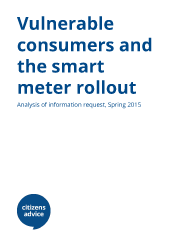Vulnerable consumers and the smart meter rollout - analysis of information request, Spring 2015
Ar y dudalen hon

In 2014, Citizens Advice commissioned and published research 223 KB into the ways vulnerable consumers could be helped during the smart meter rollout. We identified success criteria for extra help and explored ways in which it could be delivered, including through a workshop with suppliers, Smart Energy GB and potential community partners.
Six months on, we wanted to understand progress and so issued an information request (see Annex, p34).
The questions are based on the framework provided by the Smart Metering Installation Code of Practice (SMICoP) and our earlier research findings. From the responses, we have identified a number of issues that need addressing by the UK Government and other partners in the delivery of smart meters.
Head of Smart and Sustainable Energy Liz Lainé's Blog
A smart home energy strategy needs more than smart meters

Key findings
Different levels of service provision are emerging
There is a significant variance in suppliers’ plans to meet the additional needs of vulnerable consumers. SMICoP does not define what extra help should be offered, in what form, and protections such as the Energy UK Safety Net are not applied by all suppliers. The planned provision of services is not necessarily dependent on market share, although the level of preparedness is.
Housing is not recognised as a factor of vulnerability
Housing is a significant driver of fuel poverty but the suppliers’ practical application of vulnerability is driven by personal characteristics (physical ability, health, financial), not housing quality or tenure. As a result, energy efficiency advice is not tailored and is largely limited (where specified at all) to information provision.
Without certainty over UK Government energy efficiency policy from 2017, specifically the replacement or continuation of the Energy Company Obligation, there is no potential to plan, or require, an integrated approach.
Benefits are dependent on information provision
Suppliers generally define the benefits for vulnerable consumers as the provision of better and more accessible information through the in-home display (IHD), however, the provision of energy efficiency advice is not yet defined.
Vulnerable consumers are less likely to be able to act on the information provided to cut their bills, undermining the potential benefit of smart meters. They may also find it difficult to get a satisfactory resolution to issues arising at the point of installation.
Recommendations
1. Citizens Advice to consider publicly reporting on smart meter service provision for vulnerable consumers, by supplier, from DCC Live ( the point at which the data and communications systems are in place to connect smart meters to the systems of energy suppliers, network operators and other authorised services.).
2. SMICoP, Smart Energy GB and suppliers to report to the UK Government on the impact of the smart meter rollout on vulnerable consumers.
3. UK Government to define energy efficiency advice provision, embedding links between the smart meter rollout and fuel poverty programmes.
4. SMICoP to require Energy Efficiency Guidance offered to the Customer presents support and guidance relevant to their property type and tenure.
5. Suppliers and networks to work with consumer representatives to identify consistent and fair resolutions to issues arising at the point of installation.